democracynow.org
Stories:

Cornel West on Donald Trump: This is What Neo-Fascism Looks Like
President-elect Donald Trump has announced a handful of new cabinet picks with deep ties to Wall Street. On Tuesday, he named Steven Mnuchin to be Treasury Secretary. Mnuchin is a former executive for Goldman Sachs, where his father also worked. Mnuchin’s hedge fund also played a role in the housing crisis, after it scooped up the failing California bank IndyMac in 2008. Under Mnuchin’s ownership, IndyMac foreclosed on 36,000 families, particularly elderly residents trapped in reverse mortgages. Mnuchin was accused of running a "foreclosure machine." Trump has also picked billionaire private-equity investor Wilbur Ross to be Commerce Secretary. Ross specializes in flipping bankrupt companies for profit, often buying the U.S. companies at low prices and then selling them to overseas investors. He and his companies have sometimes engaged in the very practices Donald Trump rails against: shipping jobs and factories overseas. For more on these picks, we speak with Cornel West, Professor Emeritus at Princeton University. During the Democratic primary he endorsed Bernie Sanders. After Hillary Clinton won the nomination West made headlines when he endorsed Green Party presidential candidate Jill Stein.
TRANSCRIPT
This is a rush transcript. Copy may not be in its final form.
NERMEEN SHAIKH: "Wall Street Wins Again as Trump Chooses Bankers and Billionaires." That was the headline in piece by Bloomberg, on Wednesday, shortly after Donald Trump tapped former Goldman Sachs executive Steven Mnuchin to be his Treasury secretary and billionaire investor Wilbur Ross to head the Commerce Department. This comes as Politico is reporting Trump is also considering Goldman Sachs president Gary Cohn for a top post. The two met at Trump Tower on Tuesday. Trump’s chief strategist Steve Bannon is also a former Goldman Sachs Vice President who went on to head the right-wing Breitbart news site.
AMY GOODMAN: Wall Street has celebrated the news. On Wednesday, Goldman Sachs stock jumped 3.6% to an eight-year high. This all comes after Donald Trump campaigned on an anti-establishment message often publicly criticizing his opponents for their ties to Goldman Sachs. Here’s Trump speaking about Ted Cruz 10 months ago.
DONALD TRUMP: What he wanted to do is say, I will protect you from Goldman Sachs. I will protect you from Citibank. And I will protect you from the banks, because I’m Robin Hood and I’m this wonderful senator and I’m going to protect you from these banks, and then he’s borrowing from the banks. And by the way, he’s got personal guarantees. And he got-low interest loans. He got low-interest loans. They’re low interest. And now he’s going to go after Goldman Sachs? It doesn’t work that way. Goldman Sachs owns him. Remember that, folks. They own him.
NERMEEN SHAIKH: On Wednesday, Democratic Senator Sherrod Brown of Ohio, the ranking member of the Senate Banking Committee, criticized Donald Trump for picking former Goldman Sachs executive Steven Mnuchin to be Treasury secretary. Brown said, "President-elect Trump campaigned against big money’s power in Washington and accused Wall Street and hedge funds of getting away with murder. But now he’s picked a hedge-fund manager whose Wall Street ties couldn’t run deeper to lead the Treasury Department, which is exactly what this election showed the American people don’t want. This isn’t draining the swamp, it’s stocking it with alligators." The words of Senator Sherrod Brown.
AMY GOODMAN: Well, to talk more about the election of Donald Trump, his cabinet picks, and much more, we’re joined by Cornel West, Professor Emeritus at Princeton University. During the Democratic primary, he endorsed Bernie Sanders. After Hillary Clinton won the nomination, West made headlines when he endorsed Green Party presidential candidate Jill Stein. Welcome back to Democracy Now! It’s great to have you with us.
CORNEL WEST: I just thank God for Democracy Now! because journalism is almost dead as we move into this neofascist age. And thank god you all are still willing to tell the truth.
AMY GOODMAN: Well, your response to the election of Donald Trump and now the cabinet he is appointing around him?
CORNEL WEST: Well, I think he’s already betrayed working people in terms of making sure, in his view, that Wall Street is in the driver’s seat. And what I mean by that is that in an emerging neofascist moment, you have the rule of big business, which is big banks and big corporations. You scapegoat the most vulnerable. It could be Muslims, Mexicans, gay brothers, lesbian sisters, indigenous peoples, black peoples, jews, and so on. And then you also have militaristic orientations around the world. And so, you see the extension of the repressive apparatus, as those of us who hit the streets, those of us who will be — are willing to go to jail, we’ve had to recognize we’ll have more coming at us under Trump administration. But, the crucial thing is, is that he had talked about his connection with working people. And it’s clear that the one percent are still running things.
NERMEEN SHAIKH: But, you’ve also said, Dr. West, you just said that his administration will be neofascist. Could you explain? What do you mean by that, neofascist as opposed to fascist, and what the two mean?
CORNEL WEST: What neofascist — it’s an American style form of fascism. What I mean by that is we’ve had neoliberal rule from Carter to Obama. That neoliberal rule left in place a national security state. It left in place massive surveillance. It left in place the ability of the president to kill an American citizen with no due process. That’s Obama. That was the culmination of the neoliberal era. Now you get someone who is narcissistic — which is to say out of control psychologically — who is ideologically confused — which is to say, in over his head — and who does he choose? The most right wing reactionary zealots which lead toward the arbitrary deployment of law, which is what neofascism is, but to reinforce corporate interests, big bank interest, and to keep track of those of us who are cast as peoples of color, women, jews, Arabs, Muslims, Mexicans, and so forth, and so — So, this is one of the most frightening moments in the history of this very fragile empire and fragile republic.
AMY GOODMAN: So, I want to talk about some of the picks of Donald Trump, like President-elect Donald Trump’s treasury secretary, Steven Mnuchin, deep ties to Wall Street including working as a partner for Goldman Sachs, where his father also worked. Mnuchin’s hedge fund also played a role in the housing crisis after it scooped up the failing California bank IndyMac in 2008. Under Mnuchin’s ownership, IndyMac foreclosed on 36,000 families, particularly elderly residents trapped in reverse mortgages. People would go to Mnuchin’s home to protest outside as they were foreclosed out of their own homes. Mnuchin was accused of running a foreclosure machine. The bank, which was renamed One West, was also accused of racially discriminatory lending practices. In 2015 Mnuchin sold a bank for $3.4 billion, $1.8 billion more than he bought it for.
CORNEL WEST: This is what you call spiritual blackout. There is a level of callousness. There’s a level of indifference toward poor and working people. Preoccupation with greed and most importantly, lack of accountability. Doing anything they can do unless, in the end, they get caught by the law, and of course, oftentimes they have already disproportionately influenced those who apply the laws, those who supposed to be regulating them. And so, this is another instance of Wall Street run amok. I mean, I, and some of us were very critical [indiscernible] and others, very critical of Geithner, Summers, the Ruben crowd straight out of Wall Street when brother Barack Obama moved into the White House.
AMY GOODMAN: Summers, who you knew well because he was president of Harvard when you were there a professor there —
CORNEL WEST: Absolutely.
AMY GOODMAN: — and got in a bit of an altercation with him.
CORNEL WEST: Bless his soul. But — so that you can see on the neoliberal rule, Wall Street’s still in the driver seat. We were hoping, with brother Bernie Sanders, that we could bring the neoliberal era to a close. And by neoliberal, what I mean is, when you see a social problem, you financialize, you privatize, and militarize. You get mass incarceration on the one hand, privatize schools — I know sister Diane Ravitch, on of the great prophetic voices of our time, in this regard will talk about this later — and then you militarize, which is to say drop bombs on seven Muslim countries and then wonder why Muslims are upset. Or you drop bombs on innocent children with U.S. drones and then wonder why the gangsters, the fascists coming out of the Muslim world, are organizing. And of course, we’ve got to be anti-fascist across the board. But this is going to be the most trying of times in our lifetime. There’s no doubt about it. And at 63 years old, I am thoroughly fortified for this fight. I will tell you that.
NERMEEN SHAIKH: Well, given that people who voted for Trump and continuing with what you said, many have questioned how Trump, who after all is a billionaire born into a wealthy family, how did he become a working class hero so widely perceived among the people who voted for him as someone outside of the American economic and political elite class?
CORNEL WEST: Well, a significant number of those who voted for Trump were actually working people, middle-class people, who are looking for a way out given the fact they’re losers under neoliberal globalization. And they tilted toward Bernie Sanders, but the Democratic Party and its neoliberal regime marginalized him and us. And so, the only alternative is this pseudo-populist billionaire with these narcissistic sensibilities and fascist — neofascist proclivities. And he presented himself as caring for their situation. And so, that economic insecurity, that economic neglect is very real. There’s no doubt about that. And it’s disproportionate white brothers and sisters, but they are suffering. And it was a cry of the heart.
Unfortunately, given the right-wing populist and the authoritarian orientation of Trump, he uses that kind of anguish to scapegoat Mexicans, Muslims, and others rather than confront the most powerful — 21 percent of those who voted for Trump do not like him, but they feel as if they had no alternative. And we have to keep in mind 42 percent of our fellow citizens didn’t go to the polls at all. Already given up on the system, you see. And so, the system itself is, now, is in such a chronic crisis. And we said before the election that Trump would be a neofascist catastrophe. And it’s very clear from his picks that he is moving in that direction.
AMY GOODMAN: I want to turn to Bernie Sanders. We had the first extensive hour with Bernie after the election. I spoke to him Monday night at the Free Library. We played it Tuesday. He spoke about how he hopes to reform the Democratic Party as the new chair. Well, it’s a new position called the outreach position. He’s now in the Senate Democratic leadership. Even if he is an independent socialist. This is Bernie Sanders.

Cornel West: Unlike Bernie Sanders, I'm Not Convinced the Democratic Party Can Be Reformed
In the wake of Donald Trump’s election victory over Hillary Clinton, some progressives are now pushing a shake up of the Democratic Party’s leadership in efforts to reform the party. But Dr. Cornel West says he doubts the Democratic Party can be reformed. During the Democratic primary, West endorsed Bernie Sanders. Sanders later picked him to serve on the Democratic platform committee. After Hillary Clinton won the nomination, West made headlines when he endorsed Green Party presidential candidate Jill Stein. For more we speak with West about the Democratic Party and what organizing looks like in the wake of the election.
TRANSCRIPT
This is a rush transcript. Copy may not be in its final form.
AMY GOODMAN: So, a lot of questions, and I encourage people to watch the full hour at democracynow.org. You were a big supporter of Bernie Sanders. You served on the Democratic Platform Committee on behalf of Bernie Sanders. Do you think he’s right to re— work on reforming the Democrats rather than focus on building a new party? He is leading a movement called our revolution. He has said we have to work with Donald in different ways. He says to the people who supported him. Elizabeth Warren, in the last day, has said she is not so clear she’s going to be working with Donald Trump. I mean, very interesting when Barack Obama came in, Mitch McConnell made it clear they won’t work with Obama at all. But, what are your thoughts on all of this, the inside/outside strategy?
CORNEL WEST: Well, I think there’s going to be a lot of different responses. I have a deep love and respect for brother Bernie Sanders. I always will. I don’t always agree with him. I’m not convinced that the Democratic Party can be reformed. I think it still has a kind of allegiance to a neoliberal orientation. It still has allegiance to Wall Street, the very victory of Nancy Pelosi is a sign that neoliberalism is still hegemonic in the party. I hope that Keith Ellison is able to present a challenge to it. But, my hunch is —
AMY GOODMAN: — as head of — if he makes it is head of the Democratic National Committee.
CORNEL WEST: If he’s head of the DNC. But my hunch is the Democratic Party has simply run out of gas. I mean, this is a party that couldn’t even publicly oppose TPPwhen we debated that in the Platform Committee. And that’s just one small example. Couldn’t stop — couldn’t vote to stop Fracking, and so on. So, it’s still so tied to big money.
AMY GOODMAN: Even though Hillary Clinton had changed her position, because of the pressure of Bernie Sanders on TPP?
CORNEL WEST: Exactly, and tight there in the debates, they got the word from the White House, we didn’t want to embarrass the president. Embarrass the president? What about the poor and working people who are dealing with the suffering? Is that less important than embarrassing the president? And they were very clear about that. And I pushed and pushed and pushed. Here’s somebody — they can’t even talk about the Israeli occupation honestly. The president uses a language in 2009, they can’t use it in the platform. Why? Because they tied to the lobby, they tied to APEC. So that, when you have those kinds of restraints on you, these albatrosses around your neck, how are you going to be a party for the people? How you going to be a party for working people, poor people. How you going to be a party for those brothers and sisters in Yemen who are dealing with U.S.-supported troops and bombs killing them, mediated with Saudi Arabian government? How you going to deal with the Palestinians, deal with the Israeli occupation? How you going to deal with Africans, the expansion of afrikom, and so forth? There has to be some integrity and moral consistency. And unfortunately, the Democratic Party just strikes me as not being able to meet that challenge. But, I’ll work with brother Bernie Sanders and others both out of love and because I know in his heart he’s got a certain deep commitment to working people. But now, even as an independent socialist, he’s behaving as a New Deal liberal.
AMY GOODMAN: What does that mean?
CORNEL WEST: That means that he is a — well, a Democratic Socialist is a radical who’s critical of the system. A New Deal liberal works within the system and doesn’t want to bring massive critique for structural change. And I can understand it because he’s inside. But those of us who are outside and free, we’re going to tell the truth. We’re going to be honest. We will have certain kind of moral and spiritual integrity. And no matter how marginal that makes us, we’re not, in any way, going to become well-adjusted to this injustice out here.

Cornel West on Keith Lamont Scott Case: Yet Again An Officer Gets Away With Killing a Black Man
In Charlotte, North Carolina, people took to the streets Wednesday night to protest the announcement that police officer Brentley Vinson will not face charges for fatally shooting African American father Keith Lamont Scott. We talk to Dr. Cornel West about the Keith Lamont Scott case and the national issue of police brutality.
TRANSCRIPT
This is a rush transcript. Copy may not be in its final form.
AMY GOODMAN: Jimi Hendrix here on Democracy Now!, democracynow.org, The War and Peace Report. I’m Amy Goodman with Nermeen Shaikh.
NERMEEN SHAIKH: In Charlotte, North Carolina, people took to the streets, Wednesday night, to protest the announcement that police officer Brentley Vinson, will not face charges for fatally shooting African American father Keith Lamont Scott. At least four people were arrested as protesters marched with signs reading, "How to get away with murder: Become a cop."
PROTESTER 1: Hands up!
CROWD: Don’t shoot!
PROTESTER 1: Hands up!
CROWD: Don’t shoot!
PROTESTER 2: Don’t kill us dead in the street. You incarcerate our brothers and —
AMY GOODMAN: Keith Lamont Scott’s killing by police in September sparked massive protests in Charlotte and nationwide. Scott’s family says he was reading a book in his car in the parking lot waiting to pick up his son after school when he was approached by police officers. The dashboard camera video of the interaction, which was released after the protests, shows Scott exiting his vehicle and taking steps backwards with his arms at his sides. In the video, police fire four shots at Scott as he falls to the ground. In October, an independent autopsy ruled the shooting was a homicide.
NERMEEN SHAIKH: But on Wednesday, Mecklenburg County District Attorney Andrew Murray announced the officer Brentley Vinson, who is black, will not face charges and that the shooting was justified.
DIST. ATT. ANDREW MURRAY: After a thorough review, and given the totality of the circumstances and credible evidence in this case, it is my opinion that officer Vinson acted lawfully when he shot Mr. Scott. He acted lawfully.
AMY GOODMAN: Mecklenburg County District Attorney Andrew Murray went on to say the investigation found Scott had a gun at the scene of the shooting, although he admitted there was no evidence that Scott actually raised the gun at officers. North Carolina is an open-carry state, which means it’s legal to carry a gun. In a statement, Scott’s family members said they’re profoundly disappointed by the decision not to charge officer Vinson, who’s been on paid leave during the investigation. To talk more about the shooting of Keith Lamont Scott and police brutality, we’re still joined by Cornel West, professor emeritus at Princeton University who’s headed to Harvard University because he’ll be teaching in January. Your response to the lack of an indictment?
CORNEL WEST: We see it again. We see it again. I mean, it’s harder to send a policeman who kills an innocent civilian to jail than it is for a camel to go through the eye of a needle. I was just in court in White Plains with my dear brother Kenneth Chambers Jr. Same thing. Sitting there watching all of the witnesses. Here comes the jury and the judge. The death of our dear brother Kenneth Chamberlain Sr., no justice.
AMY GOODMAN: And people should go to our website to see the extensive work we did on that. But that was a man who was an Army veteran, had a medic alert necklace. And somehow when he was sleeping, rolled over on it. The medical people called. This was not a police interaction. Called for support for him that woke him up when people were knocking at the door. He said he was OK he didn’t want to open the door, not to worry. And they knocked down that door and killed him.
CORNEL WEST: And killed him. And then dragged him with the bloodstains shown on the door and so forth. But, we see this over and over again. What it generates, though, and this is something that’s a sign of hope, that we have a younger generation that is on fire for justice. They’re tired of this callousness and indifference toward the vulnerable. And it’s multiracial, it’s multigendered, it’s multi-sexual orientational, it’s multireligious and non-religion. That is a very positive thing. Because what neofascist elites are counting on is conformity and complacency. Look at Mitt Romney. Trump is a fraud. He’s phony. His promises are worth a diploma from Trump University. Then yesterday, he strikes me as very wise and I think it would be an honor to work with them. Just no integrity at all. But, this is not just the Mitt Romney’s, we got to watch the Democrats. You watch these neoliberals more and more bend, you watch them start rationalizing what ought to be called into question. We’ve got to draw some lines in the sand. That doesn’t mean we demonize others, but they have to have some principles. There’s got to be some integrity, some back home. And thank God we’ve got a number of young folk who do understand that.
AMY GOODMAN: Well, you have this case in North Carolina. At the same time in Charleston, South Carolina, prosecutors made closing arguments, Wednesday, in the murder trial of the white police officer Michael Slager who was captured on video, just a bystander who happened to see this happen, shooting African American Walter Scott in the back as Scott ran away. He was stopped at an AutoZone parking lot where he was going for his car, and this police officer shot him dead. Now, he was in the same jail as Dylan Roof, who now is going on trial and supposedly representing himself.
CORNEL WEST: After he kills the precious black folk in the AME Church, is taken for a hamburger on the way to jail because he’s hungry. I mean, this is the depths of more bankruptcy and spiritual blackout that I’m talking about, you see. And of course, Breitbart, what do they do? They put the Confederate flag up after these black people are killed and act as if somehow that’s some disinterested, nonpartisan act. And we know the Confederacy is neo-Nazi in the core in terms of its hatred of black people in defense of slavery. So that we’re dealing in times in which we have to be very clear, and we have to have plain speech, Frank speech, and we have to have people who are willing to put bodies on the line. This is the kind of moment in which we live. This is not a moment for the lukewarm and the faint hearted and the half-truths and the attempts to rationalize something that they think is so complicated when it’s very clear, and yet we have to do it in such a way that John Coltrane’s "Love Supreme" is at the center. You’ve got to be full of rage because you hate the injustice, but you can’t be hating people. You got to hate the injustice and keep love at the center. And that’s very much what was wonderful about what you did at North Carolina. You were there because you’ve got a love for precious indigenous brothers and sisters —
AMY GOODMAN: North Dakota.
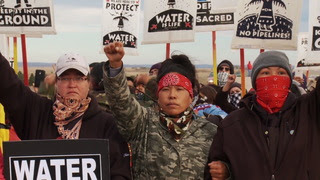
Cornel West: I Am Heading to Standing Rock to Show Solidarity With Historic Indigenous Uprising
Amnesty International is calling on the U.S. Justice Department to investigate the violent police crackdown against Native American water protectors and their allies fighting the $3.8 billion Dakota Access Pipeline at Standing Rock in North Dakota. The call comes after Amnesty sent a delegation of human rights observers to witness the crackdown, which has including police using rubber bullets, tear gas, concussion grenades, sound cannons, water cannons in subfreezing temperatures, and other military-style weapons that have injured hundreds of people. We speak to Dr. Cornel West about why he is soon heading out to Standing Rock to show solidarity.
TRANSCRIPT
This is a rush transcript. Copy may not be in its final form.
AMY GOODMAN: So, you’re headed to North Dakota this weekend, which is a major weekend because December 5 is the date that the Army Corps of Engineers set, saying that people must leave the area — although, the state authorities, and even the local authorities, have said they are not going to move in on the land to arrest people. It’s very complicated messages that are coming out right now. Clearly, President Obama is involved with this. He visited the Standing Rock tribe in 2014 — and that’s rare for an American president to go to a reservation — so he knows his case well. He was the one to issue that unprecedented three-agency order from Interior, Justice and Army saying that they are — will hold off on granting the permit. But, where do they stand now? They have not said they will not grant this permit.
CORNEL WEST: Well, I mean President Obama, he specializes in symbolic gestures because he gives pretty speeches. He’s very brilliant, he’s very charismatic. But, when, in terms of — when in comes time to implement and execute on the ground, often times he’s — there’s a deficit there. We’ll see whether he comes through.
AMY GOODMAN: So what are you going to do there?
CORNEL WEST: I’m just going down to show my love and solidarity. I was invited by — I was honored to be invited by the elders, as you know of 200 nations. This is the biggest coming together since the 19th century for indigenous peoples’ struggles. And I just come as a brother, as a comrade to be in solidarity with them and I go there and follow instructions. I want to be a force for good there in that context.
AMY GOODMAN: And after that, January, you’re going to be teaching back at Harvard. What are you going to be teaching? What are you becoming a professor of?
CORNEL WEST: Teach a course as the professor of the practice of public philosophy. I mean, it’s amazing. It’s very kind of them to invite me back, I must say.
NERMEEN SHAIKH: Explain what that means, to be a professor of public philosophy.
CORNEL WEST: Well, it means simply to engage in a truth telling and an analysis of structures and institutions, and try to shape souls and characters of young people in such a way that they are willing to take stands on issues that has as much to do with the destiny of both this nation and the world. But, it’s a robust, uninhibited dialogue, because you’ve got conservative interests, liberals, radicals, and so forth there. But I’ll be teaching with Roberto Unger at the law school. I’ll be at the divinity school teaching with Du Bois. And thank god brother Larry Bobo, and Skip Gates, and the others were kind enough to invite me back, as well. So, I look forward to being in the Boston area. It’s not my favorite part of the country. I’m from California. But, I know you know whole lot about Harvard — She’s a graduate. She’s a graduate, too.
AMY GOODMAN: In this last-minute, in this last minute, Fidel Castro?
CORNEL WEST: Yeah, brother Castro. Good God, his solidarity with struggles in Africa, with —- historically -—
AMY GOODMAN: Did you ever meet him?
CORNEL WEST: I never met him. I went to Cuba and I was characterized as a counterrevolutionary with a smile because I called for the rotation of elites. I’m a radical democrat, democratic socialist. I believe that leaders ought to rotate. So, I called for the rotation of elites, and they pulled me in the palace. What are you talking about? This is critique. Oh yeah, I’m critical, absolutely. But at the same time, I salute the health system. I salute the education. I salute the fact that he stood up in the face of American imperial power, 630 assassination attempts, fought back against the Bay of Pigs and affirmed, most importantly, the greatness of the Cuban people. They suffered under Batista. And they did suffer under Castro in terms of his repression of dissenting voices. But at the same time, they now emerge powerful again. And I think it’s a magnificent history of the Cuban people. But, Castro was always, for me, been a fascinating figure, heroic figure. But, still, I was very critical of the — of repression and not rotating, not having the kind of turnover in leadership that I would have liked to see. But, he’s one of the great revolutionary Communists of the 20th century, and, as a revolutionary Christian, I love him.
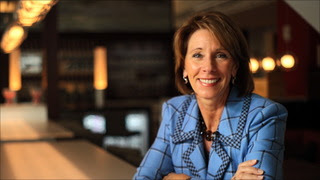
Public (School) Enemy No. 1: Billionaire Betsy DeVos, Trump's Pick for Education Secretary
Donald Trump has tapped conservative billionaire Betsy DeVos to serve as Education Secretary. DeVos is the former chair of the Michigan Republican Party and a longtime backer of charter schools and vouchers for private and religious schools. In response, American Federation of Teachers President Randi Weingarten said, "In nominating Devos Trump makes it loud and clear that his education policy will focus on privatizing, defunding and destroying public education in America." Since 1970, the DeVos family has invested at least $200 million in various right-wing causes. DeVos’s father-in-law is the co-founder of Amway and her brother is Erik Prince, founder of the mercenary firm Blackwater. For more, we speak to former Assistant Secretary of Education Diane Ravitch, Center for Media and Democracy executive director Lisa Graves, and elected member of the Detroit Board of Education Tawanna Simpson.
TRANSCRIPT
This is a rush transcript. Copy may not be in its final form.
AMY GOODMAN: I’m Amy Goodman with Nermeen Shaikh.
NERMEEN SHAIKH: Donald Trump has tapped conservative billionaire Betsy DeVos to serve as education secretary. DeVos is the former chair of the Michigan Republican Party and a longtime backer of charter schools and vouchers for private and religious schools. In response, American Federations of Teachers’ President Randi Weingarten said, "In nominating DeVos Trump makes it loud and clear that his education policy will focus on privatizing, defunding and destroying public education in America." If confirmed by the Senate, DeVos could become the most into public school education secretary since the Office of Education was established in 1867. The "New York Times" notes DeVos helped turn her home-state of Michigan into one of the nations biggest school choice laboratories, and the result was disastrous.
AMY GOODMAN: The DeVoses have bankrolled their school deregulation and privatization efforts through a dark money group called, American Federation for Children, a major contributor to the right-wing corporate education movement. They’ve also pushed controversial anti-union state legislation known as Right-to-Work, dealing a major blow to the labor movement, including the teachers unions, in Michigan. Since 1970, the DeVoses have invested at least $200 million in various right-wing causes. DeVos’ father-in-law is the co-founder of Amway and her brother is Erik Prince, founder of the mercenary firm Blackwater. For more, we’re joined by three guests. In Detroit, Michigan, we’re joined by Tawanna Simpson, an elected member of the Detroit Board of Education. In Madison, Wisconsin, Lisa Graves is with us, executive director of the Center for Media and Democracy. Her piece is titled, "5 Things to Know about Billionaire Betsy DeVos, Trump Education Choice."And here in New York we’re joined by Diane Ravitch, the former assistant secretary of education under President George H.W. Bush. Historian of education, best-selling author of over 20 books, including Reign of Error: The Hoax of the Privatization Movement and the Danger to America’s Public Schools, as well as The Death and Life of the Great American School System: How Testing and Choice Are Undermining Education. We welcome you all to Democracy Now! Lisa Graves, let’s begin with you. What do you think are the five most important things to know — understand about President Trump — President-elect Trump’s education pick?
LISA GRAVES: Well, I think he chose, perhaps, the most unqualified person he could for this position. She’s an enemy of public schools. She is someone who has used her inherited wealth and the wealth that she has married into to try to distort and reshape our laws to advance her personal views, which are that we should basically redefine public education to mean our tax dollars should be going to fund private schools, religious schools that advance her worldview. And so, she’s someone who didn’t even send her kids to public schools. She someone who, basically, has devoted her wealth to attacking our campaign finance laws, to attacking labor laws, and to attacking the very idea of having universal public education for all students that’s truly public. So, she’s someone who is manifestly unqualified. I think it is going to be enormous battle nationally and in our states to protect our public schools, which is really one of the greatest innovations of America in the past century to have universal public education, truly public schools for all and to really invest in those schools. Putting her in charge of the Department of Education really is an insult to all of the many teachers and educators and principals and so many Americans who have come through our public schools, who have had a chance in this economy to make it in their lives in part due to this commitment of America to public schools which we need to invest more versus the sort of alternatives that Betsy DeVos has pushed, including charter schools that have sucked billions out of our public education system and that have resulted in hundreds of millions of dollars of fraud.
NERMEEN SHAIKH: Diane Ravitch, DeVos supports vouchers and charter schools. Can you explain what vouchers are and what the key differences are between public schools and charter schools, because some say that charter schools enable more choice.
DIANE RAVITCH: Well, they do enable choice, but they’re not necessarily better schools. What they, basically are, are privately managed, privately run and, in many cases, for-profit schools. Michigan has many charter schools and eighty percent of them are running for profit. So, these are privately owned schools. It’s the first step toward privatization. And they are schools that are open to students — which students can choose — but very often, they’re worse than the public school that they’re leaving. A voucher, on the other hand, is a plan to give the money directly to the family — although, they never see the money, they’re just told, you now have a voucher, it’s worth $5,000, $6,000, $8,000 — whatever the voucher is, you can go anywhere with it. You can go to a commercial school, you can go to a charter you can go to a religious school. So, this breaks the long history of a separation of church and state because most of the vouchers that are used in the states that now have vouchers are for religious schools. And most of them are not going to — it’s not enough money to go to an elite school or to the best school, it’s usually very, like in the South, it’s backward fundamentalist church schools that have uncertified staff.
AMY GOODMAN: What is your assessment of Betsy DeVos’ educational background?
DIANE RAVITCH: Well, I agree with Lisa, she’s the most unqualified person ever to be nominated for this. But, more than that, she represents the religious right. She is unusual in that she is a representative of the religious right with billions of dollars behind her. So, her American Federation for Children has used its strategic giving to promote vouchers all over the country. And there are many states — about half the states now have some form of voucher. But the important thing to know about vouchers and charters is, neither of them has ever been approved popular vote. The DeVos family, Betsy DeVos in particular, launched a referendum in Michigan in the year 2000. It was rejected by sixty nine percent to thirty one percent. There have now been six or eight state elections since 1990. They have been turned down by seventy to thirty — sixty five, thirty five — overwhelmingly in every state where they have been tried, where the vouchers have been put forth they’ve been turned down. In this last election, this year, two states, Massachusetts and Georgia, overwhelming majorities opposed charter school expansion. So, there has never been a popular expression saying we want to get rid of our public schools and replace them with privately managed charters or vouchers that you can take to any place.
AMY GOODMAN: So, let’s go right to Michigan where Betsy DeVos lives. Tawanna Simpson, you are an elected member of the Detroit Board of Education. Can you share your response when you heard that President-elect Donald Trump had tapped Michigander Betsy DeVos to be the secretary education?
TAWANNA SIMPSON: I was very disappointed and disheartened, because we have worked so hard in the grassroots here in Detroit to save our traditional public schools. Under emergency management, we worked to ensure that the legislator accepted the debt that they created in our traditional public schools. We worked very hard in advocating and lobbied for them to appropriate money to our traditional public schools. And we stop the legislator from chartering our entire school district. So, I found it very disheartening just to find out after all of the hard work that we put into it, that you know, from the federal level, it can be changed.
AMY GOODMAN: Let’s turn to Betsy DeVos in her own words speaking on Fox business network.
BETSY DEVOS: The reality is, that most charter schools in this country take the kids that are doing poorly in the schools that they were assigned to and all the parents want is greater choice for their children. The more choices we have, the more competition we have, but also the better product, or the better learning opportunity for the kids.
AMY GOODMAN: So, that’s Betsy DeVos speaking on Fox. Tawanna Simpson, what’s your experience of working with Betsy DeVos? What effect has she had on the Detroit schools where you are a board member?
TAWANNA SIMPSON: Well, you know, her and her family provide lots of money to the legislator to make sure — to ensure laws go the way they wanted, to have mandated, unaccountable and corrupt charter schools in our city. But, listen to her statement. It’s actually the opposite. Charter schools come to our traditional public schools and cherry pick the best students. They don’t take the students who need the most help because it makes no economic sense for charter schools because it would cost more money to educate students that have other needs — additional educational needs.
AMY GOODMAN: This is another clip of Betsy DeVos speaking at the American Federation for Children summit earlier this year.
BETSY DEVOS: All told, together we’ve helped more than a million kids in private school choice programs, and we are just getting started. Since we last met, Nevada, Montana, Tennessee, Mississippi, Arkansas, Wisconsin, South Carolina, Maryland, and South Dakota have all passed private school choice programs.
AMY GOODMAN: So that’s Betsy DeVos. Diane Ravitch. I mean, it all comes down to what’s best for children. What are the records on these different schools and what will it mean who is Secretary of Education — how will she compare, for example, to Arne Duncan? He also a supporter of charter schools.
DIANE RAVITCH: Well, I have to say, somewhat echoing a little bit of Cornel West that the Obama administration, in education laid the groundwork for Trump and Betsy DeVos because they were big supporters of charter schools. And I’ve been arguing for years that charter schools are the first step toward full privatization.
AMY GOODMAN: You didn’t always think that.
DIANE RAVITCH: I didn’t always think that. I know.
You worked for George H.W. Bush. You were a big proponent of charter schools.
DIANE RAVITCH: Right. Well, the charter school idea started in 1988. It was just an idea then. Then, in 1992, the first charter — 1990, the first charters opened in Wisconsin, the first one. And then they began slowly to spread. And at the time I thought, gee, that’s an interesting experiment. Al Shanker, who was — Albert Shanker — who was head of the AFT, was one of the original proponents of charters.
AMY GOODMAN: American Federation of Teachers.
DIANE RAVITCH: American Federation of Teachers. And in 1988, he said, this is a great idea, we should try this. But, by 1993, he said, charters are no different from vouchers because they both open the door to corporations coming in and running public schools. And what we have today — and I changed my mind and I wrote a book in 2010 saying charters, choice, and testing are killing education in this country. Which I still believe. But, when he renounced charters, he recognized that there was increasing corporate interest in moving into the schools. So, today we have corporate chains — and some of them are nonprofit, like KIPP — although they do taken a lot of money — and we also have for-profit charter chains run by non-educators. And we have people like Andre Agassi, who’s a high school dropout, creating a charter chain even though his own school is own Andre Agassi School is one of the lowest performing schools in the state of Nevada. We have a sector called the charter industry, which people invest — and there’re equity investors putting money into it. Wall Street is one of the biggest backers of charter schools these days because they are investing in — they make — there’s something called the new markets tax credit where they get — and Juan González wrote about this — they’re able to make a tremendous return on their investment in charters because of write offs on federal taxes by investing in charters. People from out of the country can get green cards by investing in charter school construction. There are all kinds of deals. And the biggest and sleaziest deal of all is the charter operators, the for-profit operators in particular, who buy a piece of property and then rent it to themselves at a rental that is 3, 4, 10 times the market rate. And they make tons of money, not on the school, but on the leasing.
NERMEEN SHAIKH: Were charter schools — you said the first one opened in Wisconsin in 1990 — were they ever a response to failing public schools?
DIANE RAVITCH: Actually, it was Minnesota, not Wisconsin, the first one, and it’s still there. And at the time, the original idea was that they would take in kids that the public schools were not able to help. So, they were bringing in drop outs. They were bringing in kids who had lost motivation in school, and trying to find different ways. That was the Shanker idea, is that the charter schools would fill in a need that the public schools had and help the public schools, and whatever they learned, they would return to the public schools. He never conceived them as competition where they would cherry pick their students, as the board member from Detroit mentioned. They cherry pick the best students. They kick out kids who don’t have high scores. They exclude kids who are English language learners. And they exclude kids with disabilities. They take the mildest form of disabilities, like a learning disability, and the kids who have profound disabilities are left to the public schools, which now have less money to educate them.
AMY GOODMAN: And the attitude of teachers unions towards Betsy DeVos, right now?
DIANE RAVITCH: Well, they’re very frightened because Betsy DeVos is anti-union, and she sponsored and then active in the promoting right to work laws. And she was — she and her family helped to turn Michigan from being a very strong union state to being a right to work state. She also put money — she and her husband put money into right-wing groups like Focus on the Family, which believes in conversion therapy and sponsors anti-gay activities and legislation. Her mother put $500,000 into the ballot in California, which was an effort to remove protections for gay rights. So, all of these issues, which are kind of the right-wing catalog of horribles; of gay rights, of labor union protections, or destruction, are focused around her. But, her main focus is school privatization. And school privatization was tried — has been tried in Chile and Sweden and the results have been very clear — the first and most important product is hyper segregation. Because everybody goes off to be with people just like themselves.
Headlines:
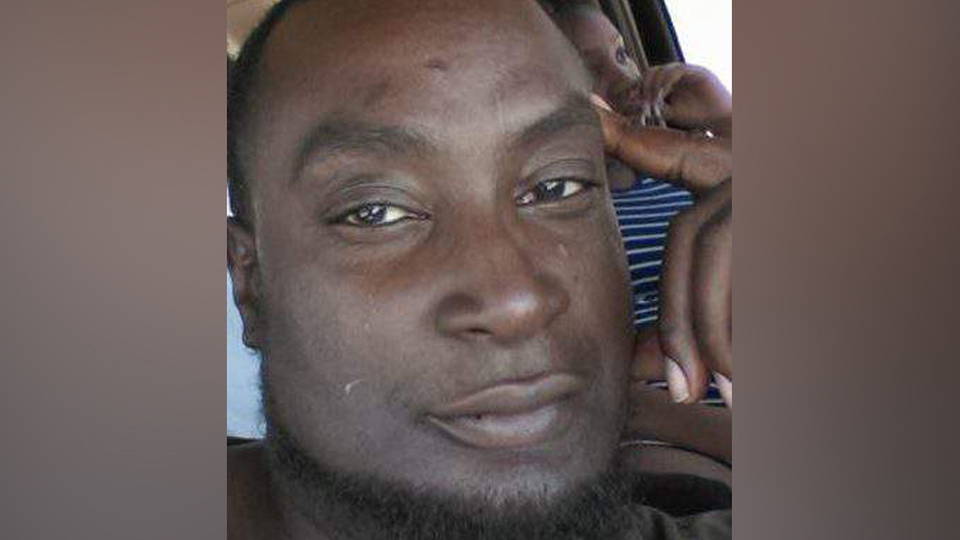
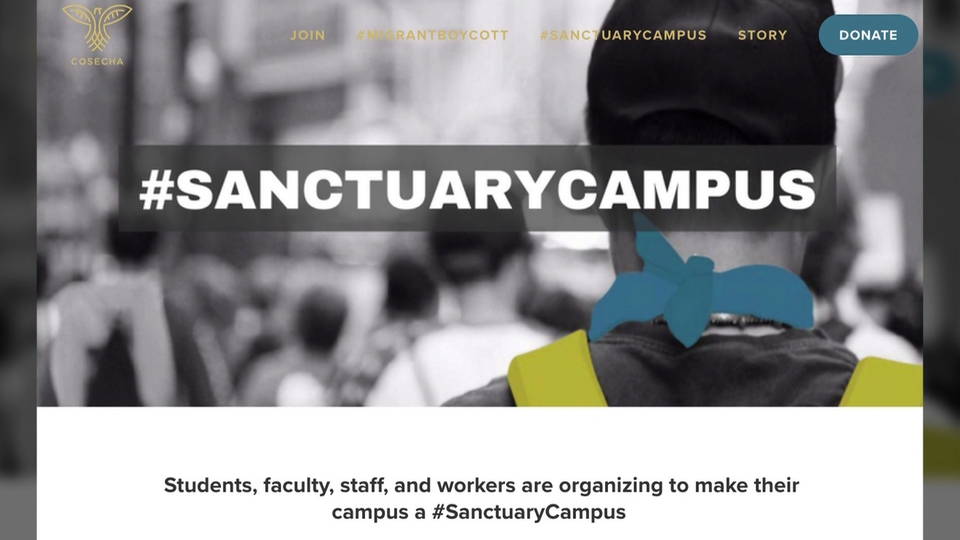
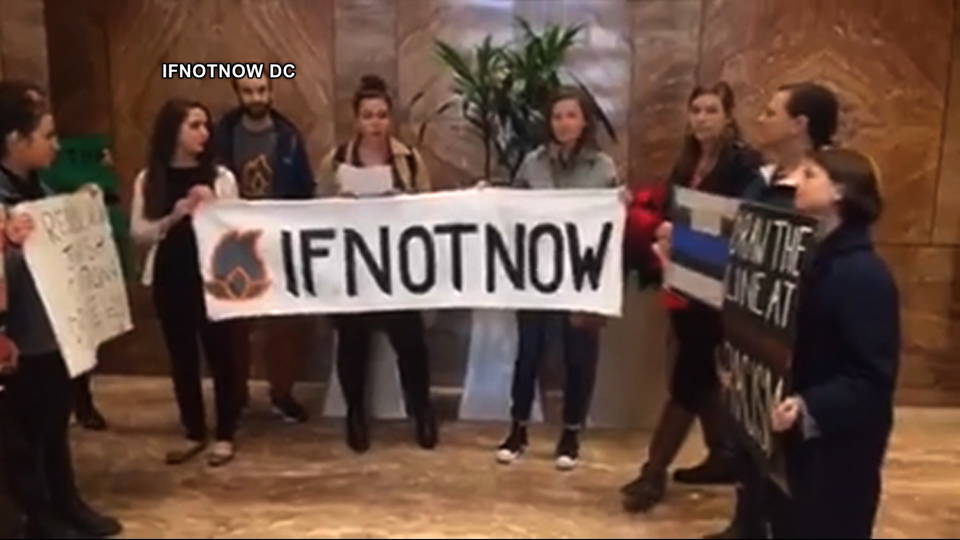
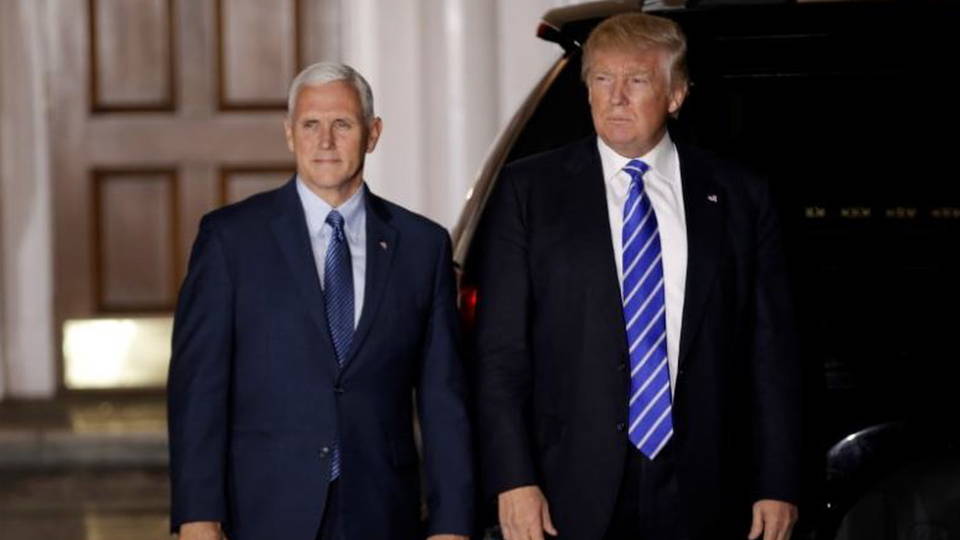
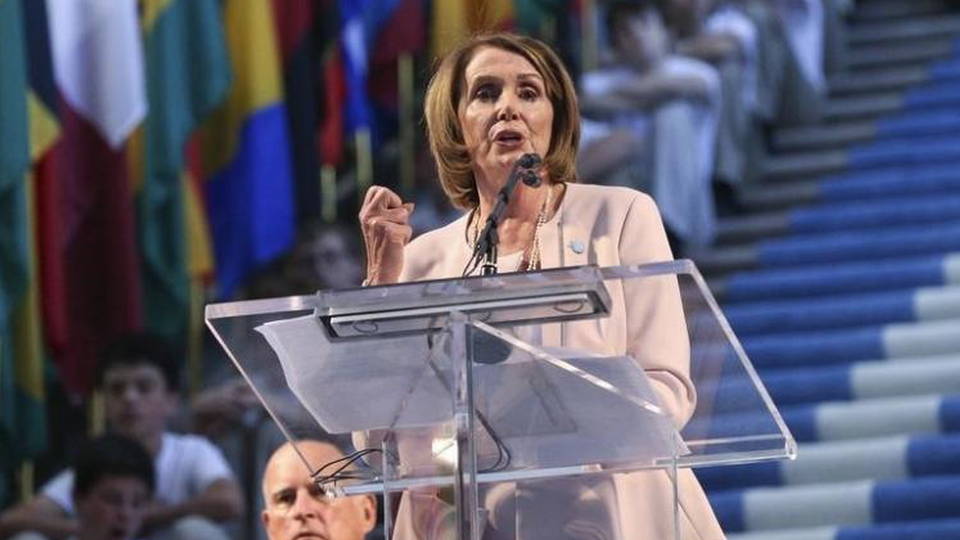
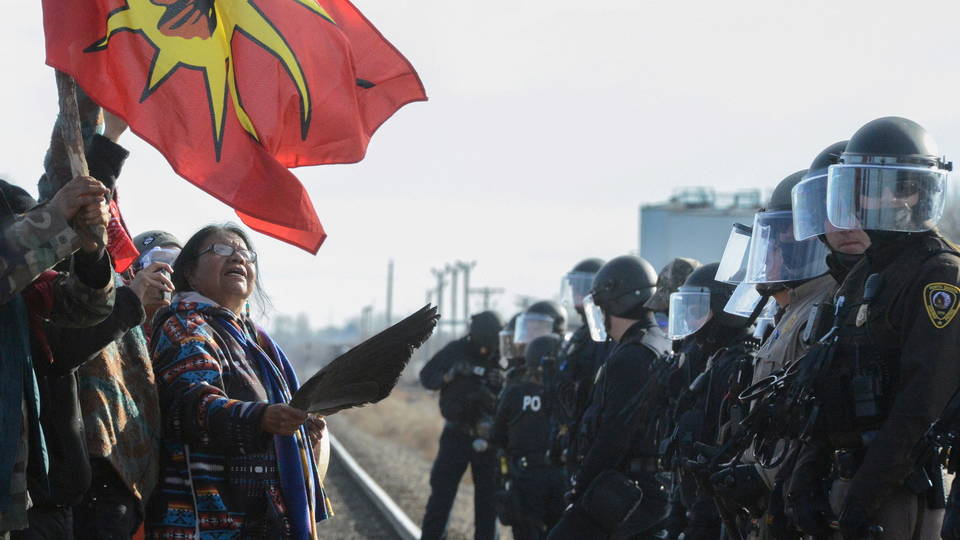
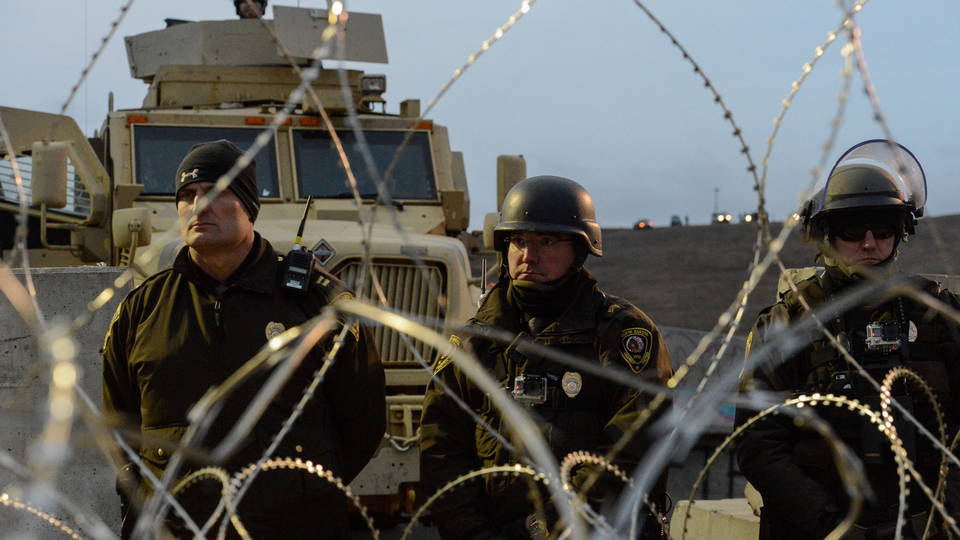



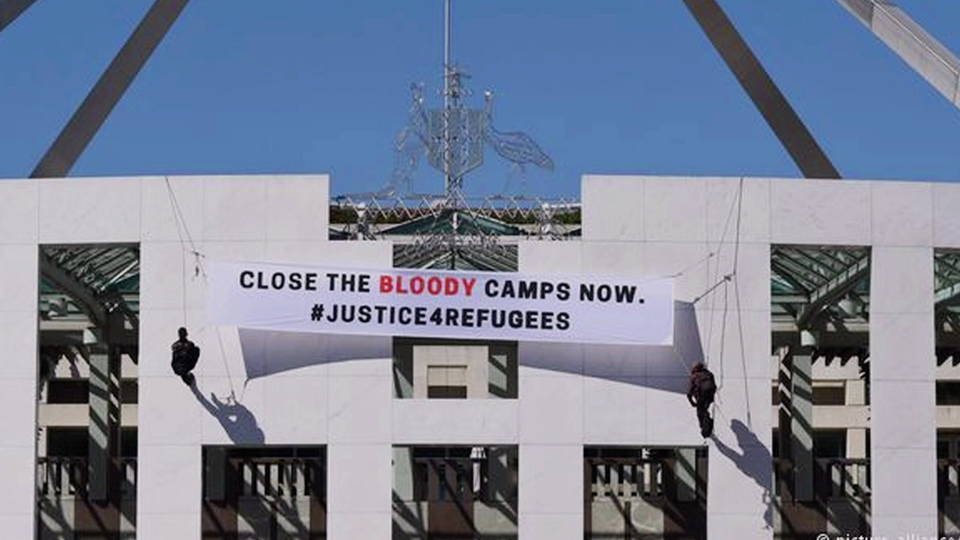

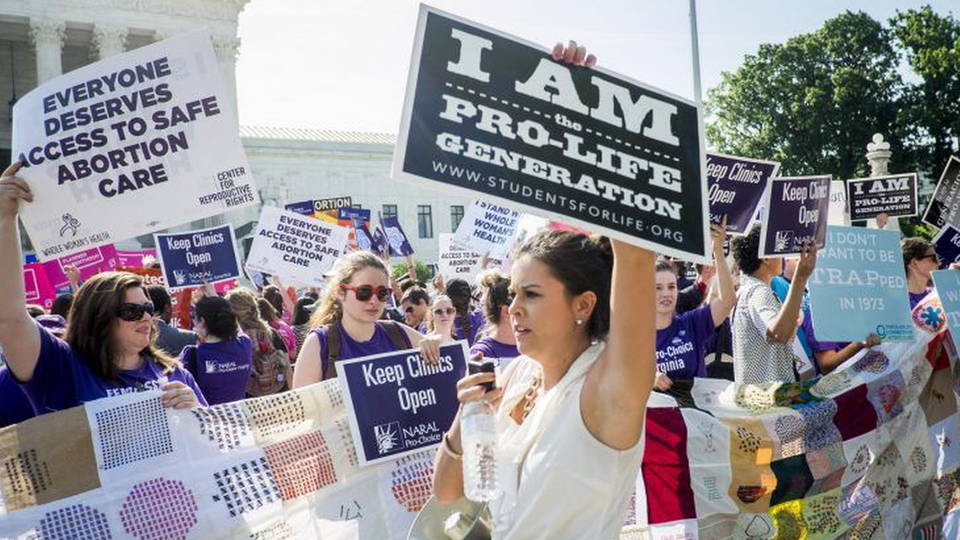

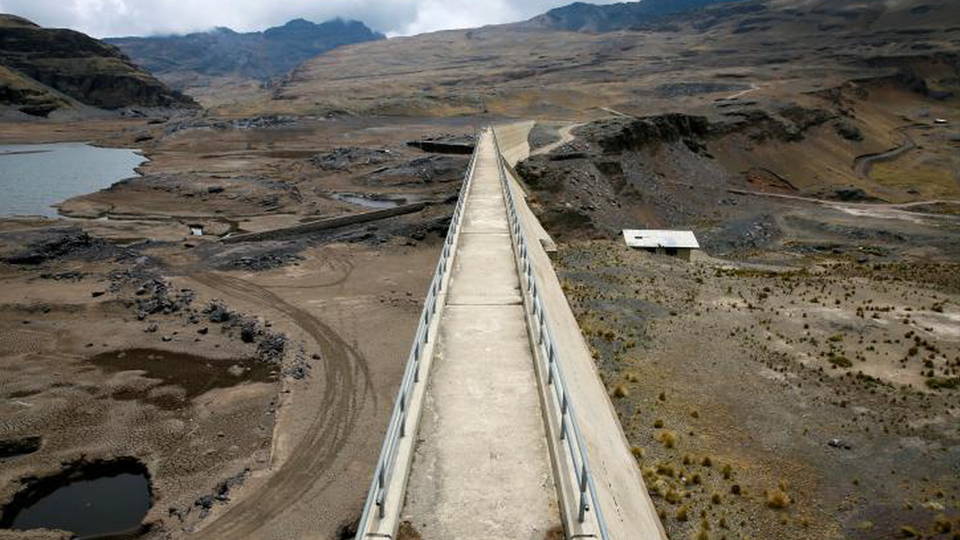
 -------
-------
Donate today:
Follow:



CELEBRATE 20 YEARS OF DEMOCRACY NOW!
Democracy Now!'s 20th Anniversary Celebration
WEB EXCLUSIVE
4 Arrested in Charlotte Protests after DA Says No Charges for Officer Who Killed Keith Lamont Scott

In Charlotte, North Carolina, people took to the streets Wednesday night to protest the announcement that police officer Brentley Vinson, who is black, will not face charges for fatally shooting African-American father Keith Lamont Scott. At least four people were arrested as protesters marched with signs reading "How to get away with murder: Become a cop." Keith Lamont Scott’s killing by police in September sparked massive protests in Charlotte and nationwide. Scott’s family says he was reading a book in his car in a parking lot waiting to pick up his son after school, when he was approached by police officers. The dashboard camera video of the interaction, which was released after the protests, shows Scott exiting his vehicle and taking steps backwards with his arms at his sides. In the video, police fire four shots at Scott as he falls to the ground. In October, an independent autopsy ruled the shooting was a homicide. But on Wednesday, Mecklenburg County District Attorney Andrew Murray announced officer Vinson will not face charges and that the shooting was justified. Murray said the investigation found that Scott had a gun at the scene of the shooting, although he admitted there was no evidence that Scott actually raised the gun at officers. North Carolina is an open-carry state, which means it is legal to carry a gun. In a statement, Scott’s family members said they are "profoundly disappointed" by the decision not to charge officer Vinson, who has been on paid leave during the investigation. Meanwhile, in Charleston, South Carolina, prosecutors made closing arguments Wednesday in the murder trial of white police officer Michael Slager, who was captured on video fatally shooting African-American Walter Scott in the back as Scott ran away.
TOPICS:
Second National Day of Action for "Sanctuary Campus" Movement

Protests against Donald Trump and his cabinet are continuing nationwide. Today students at colleges and universities across the country are holding a second day of action to demand their campuses become "sanctuary campuses," where administrators refuse to share information with immigration authorities, refuse to allow ICE agents on campus and support equal access to in-state tuition and financial aid and scholarships for undocumented students. President-elect Donald Trump has vowed to immediately deport up to 3 million people upon taking office. More than 100 campuses participated in the first national walkout on November 17, prompting a series of university administrators to agree to designate the schools as sanctuary campuses—including Trump’s alma mater, the University of Pennsylvania.
TOPICS:
"Day of Jewish Resistance": 30 Cities Protest Trump Strategist Stephen Bannon

Meanwhile, Jewish activists with the group "If Not Now" held a "Day of Jewish Resistance" in more than 30 cities to protest Trump’s pick of Stephen Bannon as his chief strategist. Bannon, who was the former head of Breitbart Media, has been called a "champion of white supremacists" by Nevada Senator Harry Reid and has been accused of domestic abuse and making anti-Semitic comments. A series of companies have begun to pull their advertising from Bannon’s former news site, Breitbart Media, amid increasing scrutiny of the site’s openly racist, sexist, homophobic and xenophobic views. On Tuesday, Kellogg Company pulled its advertising, saying the site didn’t align with the company’s values. Other companies, including Target, car insurance provider Allstate and internet service provider EarthLink, have also pulled advertising from the site. In response to Kellogg’s announcement, Breitbart claimed the company was being "un-American" and demanded a boycott of Kellogg’s products.
TOPICS:
Trump Heads to Indiana, Where He Claims to Have Saved 1,000 Jobs

President-elect Donald Trump and Vice President-elect Mike Pence are heading to Indiana to appear with workers at Carrier’s Indianapolis factory, where Trump claims he has saved 1,000 jobs from being shipped to Mexico. The parent company of the air-conditioner company is United Technologies—a multibillion-dollar company whose single largest customer is the Pentagon. Although few details have come out about the deal to keep the jobs in the state, sources say it likely had more to do with Trump threatening to cut United Technologies’ military contracts. According to the Boston Herald, Carrier is, ironically, represented by Teneo Strategies, part of a global private consulting firm co-founded by Douglas Band, a top aide to former President Bill Clinton who worked at the Clinton Foundation.
TOPICS:
Nancy Pelosi Retains Position of House Democratic Leader

On Capitol Hill, House Democratic Leader Nancy Pelosi beat back a challenge to her position by Ohio Rep. Tim Ryan. Pelosi has been the House Democratic Leader for seven terms already. During Wednesday’s closed-door meeting Ryan won 63 votes, a level of support many say points to growing discord and divisions within the Democratic Party in the wake of Donald Trump’s election.
TOPICS:
Amnesty Demands Justice Dept. Probe Violent Police Crackdown at Standing Rock

Amnesty International is calling on the U.S. Justice Department to investigate the violent police crackdown against Native American water protectors and their allies fighting the $3.8 billion Dakota Access pipeline at Standing Rock in North Dakota. The call comes after Amnesty sent a delegation of human rights observers to witness the police crackdown, which has included police using rubber bullets, tear gas, concussion grenades, sound cannons, water cannons in subfreezing temperatures and other military-style weapons that have injured hundreds of people.
TOPICS:
ND Approves $7M More to Police #NoDAPL & Threatens to Fine People Bringing Supplies to Camp

On Wednesday, the North Dakota Emergency Commission approved an additional $7 million of funding to police the ongoing resistance movement—bringing the total price tag of the policing to $17 million. This comes one day after North Dakota officials moved to block new supplies from reaching the water protectors by announcing police will begin stopping people they believe are headed to the camps and fine them $1,000 if they are found with supplies. Morton County Sheriff Kyle Kirchmeier has said, however, that police will not be arresting people in the coming days as the Army Corps of Engineers closes access to the main resistance camps on December 5. Meanwhile, Deia Schlosberg, a filmmaker who faced 45 years in prison for filming a separate pipeline protest in North Dakota, has announced on social media that the prosecution against her has been suspended.
TOPICS:
Report: Obama’s EPA Watered Down Key Study of Fracking and Water Contamination

A new investigation by Marketplace and APM Reports has revealed the U.S. Environmental Protection Agency made last-minute changes to a significant 2015 study about fracking in order to downplay the drilling practice’s threat to U.S. water supplies. Documents obtained by the news outlets show that less than two months before the five-year study’s release, EPA officials added text into the executive summary saying the researchers had not found evidence fracking has "widespread systemic impacts" on drinking water — even though earlier drafts of the report had, in fact, highlighted directly how fracking had contaminated the drinking water in more than two dozen places. EPAofficials went on to use that key phrase, claiming a lack of "widespread, systemic impacts" as the top finding in conference calls with reporters as well as in the press release accompanying the study’s publication. Food and Water Watch said the investigation confirms "political meddling" by the Obama administration.
TOPICS:
Colombian Congress Approves New Peace Deal with FARC Rebels

The Colombian Congress has voted overwhelmingly to approve a revised version of the peace deal with FARC rebels, aimed at ending the nation’s 52-year civil war. Colombians narrowly rejected an earlier version of the peace deal in a nationwide referendum in October. The congressional approval means the deal will not have to be approved by voters. Colombian president Juan Manuel Santos, who won the Nobel Peace Prize earlier this year for his work on the peace accords, is slated to speak today about the deal’s ratification.
TOPICS:
Yemen: Number of Suspected Cholera Cases Increases amid War

In Yemen, the number of suspected cholera cases is growing amid the ongoing war between Houthi rebels and the ousted Yemeni government backed by U.S.-supported, Saudi-led airstrikes. This is U.N. official George Khoury.
George Khoury: "So far we have 7,700 suspected cases of cholera in 12 governorates in Yemen. We have an increase of 27 percent in the number of suspected cases as compared to last week, although the case fatality rate is declining and that’s thanks to the response by the humanitarian partners."
TOPICS:
Australia: Protesters Demand Gov't Close Island Refugee Camps

In Australia, protesters have disrupted Parliament for the second straight day to demand the closure of refugee camps on the Pacific island nations of Nauru and Papua New Guinea. Australia has threatened to never resettle refugees who arrive by boat and have instead shipped the refugees off to these camps, where they are imprisoned indefinitely. On Thursday, activists unveiled a banner in front of Australia’s Parliament House reading "Close the Bloody Camps Now. Justice for Refugees."
Planned Parenthood Challenges Anti-Abortion Laws in AK, MO & NC

Planned Parenthood, the American Civil Liberties Union and the Center for Reproductive Rights have launched three lawsuits to challenge anti-abortion laws in Alaska, Missouri and North Carolina. The anti-abortion laws include restrictions that have shuttered all but one abortion clinic in Missouri, as well as North Carolina’s ban on abortions after 20 weeks.
TOPICS:
Texas to Require Fetal Remains be Buried or Cremated

This comes as Texas is facing backlash after approving new rules that will require fetal remains to be buried or cremated, instead of disposed of in a sanitary landfill, as is the practice with all other forms of biological medical waste. The measures are slated to go into effect in less than three weeks. Similar legislation was passed this year in both Louisiana and Indiana, where it was signed by Indiana Governor and Vice President-elect Mike Pence.
Nicaragua: Police Open Fire on Campesino Caravan en route to Capital

In Nicaragua, activists say federal police attacked a campesino caravan heading to the capital Managua Wednesday, opening fire with both live and rubber bullets and throwing tear gas. The caravan was heading to the capital to protest the construction of a $50 billion canal linking the Atlantic and Pacific oceans. Campesinos say the project could displace up to 120,000 people.
TOPICS:
Bolivia: Thousands Protest Water Shortages as Some Flee to Peru in Search of Water

In Bolivia, thousands of people poured into the streets to protest water shortages, amid Bolivia’s worst drought in more than a quarter century. The protesters said the water shortages, fueled by climate change, are being worsened by government mismanagement and industrial mining projects. Protesters are demanding the resignation of the Minister of Environment and Water. Scientists say the drought is fueled by the retreat of Bolivian glaciers as a result of global warming. Some Bolivians have already fled the country in search of water.
Lisbeth Vogensen: “I didn’t want to leave La Paz. I lived there for the last four years. My family and I were very happy there, but leaving was a decision we had to make for the well-being and health of our family. It was against our will, but we were lucky to come to Peru where there is still water."
Demonstrations Planned in Major Cities for World AIDS Day

And today is World AIDS Day. Around the world, groups are holding protests and demonstrations to call attention to the disease, including in Washington D.C., where activists plan to gather at the U.S. Capitol lawn at noon to protest House Speaker Paul Ryan’s proposed budget cuts, which they say will slash funding for programs like global HIV research and prevention. The World Health Organization says AIDS-related illnesses killed more than one million people worldwide last year.
TOPICS:
Donate today:
Follow:




CELEBRATE 20 YEARS OF DEMOCRACY NOW!

Democracy Now!'s 20th Anniversary Celebration
WEB EXCLUSIVE

Watch Bernie Sanders' Full Speech in Philadelphia: The Future of American Democracy is at Risk
NEW BOOK

12/5 New York, NY
COLUMN

How the Media Iced Out Bernie Sanders & Helped Donald Trump Win by Amy Goodman & Denis Moynihan
We hadn’t seen Bernie Sanders in Philadelphia since last July, when he watched his primary opponent, Hillary Clinton, win the Democratic Party’s nomination. Sanders joined the “Democracy Now!” news hour this week at the historic Philadelphia Free Library for a wide-ranging discussion. “I am deeply concerned about the future of American democracy,” Sanders told the enthusiastic standing-room-only crowd. Millions of Americans voted for Sanders in the primaries. He transformed the 2016 U.S. presidential election, inspiring and engaging people with a progressive vision for the future, with little help from the media.
The networks have engaged in endless “mea culpas” in the election’s aftermath, contrite about their reliance on faulty polls. Rarely do you hear a news personality on television admitting that they failed miserably in covering the Sanders campaign. The U.S. media effectively iced out a major-party candidate who consistently held the largest rallies, even without a media megaphone.
Donald Trump received blanket coverage. His every move, every tweet, almost all his speeches were covered across the networks. The U.S. corporate media made candidate Donald Trump. Estimates of the free airtime he received vary from $1 billion to as high as $3 billion.
What about Bernie Sanders? The Tyndall Report analyzed major-network campaign coverage in 2015. In over 1,000 minutes of national broadcast television airtime devoted to all the campaigns, Donald Trump received 327 minutes, or close to one-third of all the campaign coverage. Bernie Sanders received just 20 minutes. Hillary Clinton got 121 minutes of campaign coverage, six times the amount Sanders received. “ABC World News Tonight” aired 81 minutes of reports on Donald Trump, compared with just 20 seconds for Sanders.
I asked Sanders what he did to warrant a full 20 seconds of coverage on ABC, and he threw his head back, laughing out loud. “We had the misfortune of actually trying to talk about the problems facing America and providing real solutions,” he said, offering his take on the media’s failure. “Trump was tweeting out about how ugly or horrible or disgusting or terrible his opponents were, in really ugly terms. Perfect for the media. That is a great 12-second sound bite. But to talk about why the middle class is in decline or why we have massive levels of income and wealth inequality can’t be done in 12 seconds. And second of all, it’s not something that they are, frankly, terribly interested in.” While the media may not have been interested in Sanders’ message, the voters were. Despite the media blackout, Sanders won 23 primary contests and 46 percent of the pledged Democratic delegates.
After President Barack Obama leaves office, Sanders may well become the most powerful Democrat in the country, even though he is not technically a Democrat, but an independent socialist. His success has catapulted him into the Democratic leadership of the Senate. “I accept this responsibility as outreach chair with a lot of trepidation, but also with excitement. The current approach clearly is not succeeding, and we need a new approach ... to create a 50-state strategy. That means we start playing ball in states that the Democrats have conceded decades ago. But more importantly, we create a kind of grass-roots party, where the most important people in the party are not just wealthy campaign contributors, but working people, young people, people in the middle class.” It is also why he is supporting Keith Ellison’s candidacy to be chairperson of the Democratic National Committee. Ellison is the co-chair of the Congressional Progressive Caucus and also happens to be the first Muslim member of Congress.
Sanders cautions against maligning all Trump supporters. “It would be a tragic mistake to believe that everybody who voted for Donald Trump is a ‘deplorable.’ They’re not. These are people who are disgusted, and they are angry at the establishment. And the Democratic Party has not been clear enough, in my view, about telling those people ... that we are on their side.”
Bernie Sanders has transformed his campaign into a group called “Our Revolution,” to continue organizing. “Where we are now is in a difficult moment,” he summed up as our Philadelphia conversation was ending. “But throughout history, serious people have fought back. ... Think about 120 years ago. There were children working in factories, losing their fingers. People fought back. They fought to create unions. Think about the women’s movement. Think about the civil-rights movement. Think about the gay-rights movement. Think about the environmental. Think about all of the hurdles that those folks had to overcome. ... Nobody in this room or in this country has a right to say ‘I give up.’ You’ve got to jump in and start fighting.”
Bernie Sanders has spent his life fighting for progressive causes. As the world braces for the Trump presidency, Sanders shows no signs of slowing down.
-------
WORK WITH US!

Senior TV Producer
-------
207 West 25th Street, 11th Floor
New York, New York 10001, United States
-------
-------

No comments:
Post a Comment